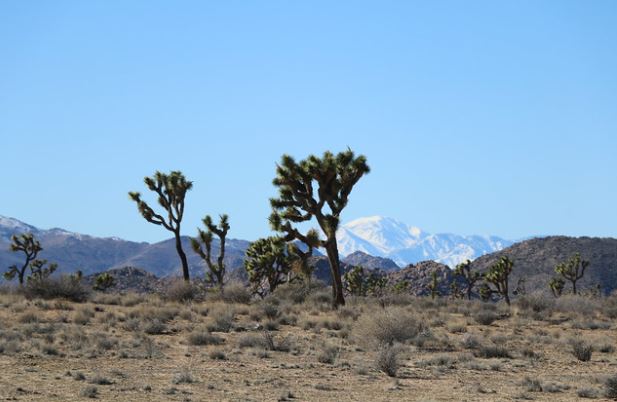Yucca brevifolia in San Bernardino County, California
Photo by JGilkeson/USFWS, 2017
Trees Remain Temporarily Protected Pending Legislative Action
February 9, 2023 - SACRAMENTO, Calif.— The California Fish and Game Commission voted unanimously on Wednesday to postpone a decision on whether to permanently protect western Joshua trees under the California Endangered Species Act. The commission agreed to wait to see whether a new bill proposed by Gov. Gavin Newsom’s administration becomes law.
Western Joshua trees will stay protected under California’s endangered species law in the meantime.
The Western Joshua Tree Conservation Act, made public late Tuesday, would provide the species protections comparable to those it would receive under the endangered species law, but with additional permitting mechanisms to address renewable energy and housing projects in its range. According to a fact sheet prepared by the state Department of Fish and Wildlife, “the permitting process for western Joshua tree is more complex than for any species currently listed under CESA.”
“Western Joshua trees are an irreplaceable and highly threatened part of California’s natural heritage,” said Brendan Cummings, the Center for Biological Diversity’s conservation director and a Joshua Tree resident. “We’re pleased the Newsom administration recognizes their importance and has proposed groundbreaking legislation to ensure these wonderful trees forever remain part of California’s Mojave Desert landscape.”
The bill is the first legislation in California specifically focused on ensuring the protection of a climate-threatened species. It requires the department to prepare a range-wide conservation plan for the species by the end of 2024, periodic reviews to ensure the effectiveness of the plan, and consultation with affected Tribes.
In June the commission deadlocked 2-2 on whether to make protection permanent and agreed to reconsider the listing decision after seeking more input from California Tribes. Tribal input so far has strongly supported protecting western Joshua trees. In October, following the appointment of a fifth commissioner, the commission again voted to delay a decision on the listing to see if legislation related to the tree would move forward.
The new legislation would provide statutory protections for western Joshua trees regardless of the outcome of the commission’s vote.
“The western Joshua tree easily meets the legal and scientific standards for protection under CESA,” Cummings said. “But absent a majority of commissioners willing to move forward with listing, this bill is the best and only available option to protect the species and its Mojave Desert home for future generations.”
The bill is expected to go through legislative committee hearings in the coming months.
Background
In 2019 the Center filed a petition to list the trees under the state’s Endangered Species Act. In September 2020 the state’s Department of Fish and Wildlife recommended that Joshua trees be temporarily protected during a yearlong study, and the commission agreed. In April 2022 the department recommended against permanent protection of the species, shrugging off concerns from independent scientific peer reviewers.
Without legal protection, climate change could wipe out western Joshua trees, which already are failing to reproduce at drier, lower elevations. Recent studies show Joshua trees are already dying off because of hotter, drier conditions, with very few younger trees becoming established. Even greater changes are projected over the coming decades.
Scientists in 2019 projected that Joshua trees will be largely gone from their namesake national park by the end of the century. An earlier study projected the species will be lost from virtually its entire range in California.
Prolonged droughts are expected to be more frequent and intense over the coming decades, shrinking the species’ range and leading to more tree deaths. Higher elevations, where some Joshua trees might survive increasing temperatures and drying conditions, are at risk of fire because of invasive non-native grasses.
Western Joshua trees are also threatened by habitat loss and degradation. Outside of Joshua Tree National Park, off-road vehicle use, cattle grazing, powerlines and pipelines and large-scale energy projects are destroying habitat. Approximately half of the western Joshua tree’s range in California is on private land, and only a tiny fraction of that habitat is protected from development. Projections show that virtually all those trees will be lost without increased legal protection.
Joshua trees come in two distinct species: the western Joshua tree (Yucca brevifolia) and the eastern Joshua tree (Y. jaegeriana). The two species occupy different areas of the desert, are genetically and morphologically distinguishable, and have different pollinating moths.
The Center for Biological Diversity is a national, nonprofit conservation organization with more than 1.7 million members and online activists dedicated to the protection of endangered species and wild places.
Source:Center for Biological Diversity









